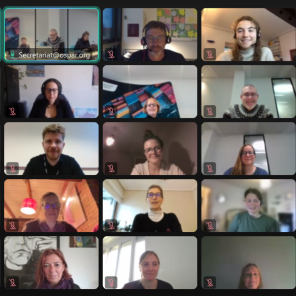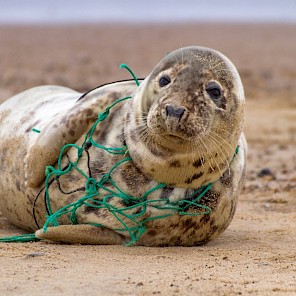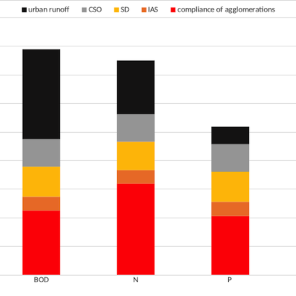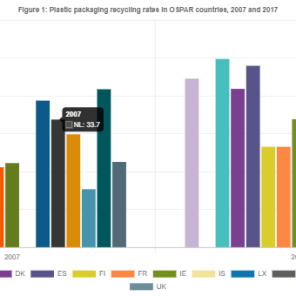| | Marine litter levels remain high despite signs of improvementOSPAR's Quality Status Report (QSR) 2023 found that overall, the amounts of marine litter in the OSPAR Maritime Area remain high, although there has been a statistically significant decrease in plastic litter on beaches in most OSPAR Regions and a decrease in floating litter in the North Sea. This can be set against an increase in annual per capita plastic consumption in OSPAR countries, with levels reaching a record 100 kg in western Europe, underlining that waste handling could have an impact on marine pollution levels. The estimated annual input of microplastics into OSPAR catchments averaged over 0,3 Mt, the largest land-based sources being tyre wear and degradation of litter. Additionally, litter from fisheries (solid waste matter including micro-sized litter, and abandoned, lost, and discarded fishing gear), aquaculture, shipping, recreational boating and offshore industries continues to threaten marine species and habitats, particularly in some OSPAR Regions. OSPAR’s 2014 Regional Action Plan for Marine Litter (RAP ML), which sets out commitments to promote waste prevention and management practices that impact significantly on marine litter, to encourage recyclability and reuse of plastic products, to assess instruments to reduce single-use items and to reduce inputs of microplastics, has mostly been implemented. However, it is clear that, despite the progress that has been made to prevent plastics from entering the marine environment, more needs to be done, and this is reflected in the second Regional Action Plan on Marine Litter, adopted in 2022.
The QSR 2023, comprising assessments of over 120 different components, is the most authoritative assessment of the North-East Atlantic. The QSR reflects the collective work of the 16 Contracting Parties to the OSPAR Convention, and over 400 scientists and experts. |  | | OSPAR's marine litter group | We'd like to say a huge thank you to OSPAR's marine litter group who met online this week. The group produced the thematic assessment, indicator assessments and feeder reports for the QSR 2023 featured in this week's newsletter. They are also responsible for our 2nd Regional Action Plan (RAP) on marine litter which includes over 25 actions to tackle marine litter in addition to our first RAP. A report of the meeting will be made available on the OSPAR website in due course. |
| |  | | Marine litter thematic assessment | Overall, marine litter levels are still high and further efforts are needed. There is a predominance of plastics among marine litter that is reported across all OSPAR Regions. Also, microplastics have been reported in sediments, surface waters, water column and in biota for the OSPAR Maritime Area at different concentrations. Single-use plastics and maritime-related litter are frequently found beach litter items at OSPAR level, with some important regional differences. Nonetheless, there are some positive signs: a decrease in the quantities of litter found on OSPAR beaches between 2015-2020 and in the floating litter in the North Sea between 2009-2018. When considered against the upward trend in plastic production and use in Europe over a similar period, this suggests that progress has been made on preventing plastics from entering the marine environment. |  READ MORE
READ MORE |
|
| | |  | | Feeder Report 2021 - Waste water | This paper summarises the status and trends in waste water in relation to potential impacts in the OSPAR area, and measures taken to manage these impacts. Waste water from domestic and commercial foul water and sewage and industrial sources can result in damaging impacts in the marine environment, particularly through emissions of nutrients, hazardous chemicals including oestrogens and antibiotics as well as litter, including microplastics. |  READ MORE
READ MORE |
| |  | | Feeder Report 2021 - Production and Consumption of Plastics | This report deals with the production, use and disposal of plastics in the OSPAR area. It describes general measures relating to waste prevention and management, including some relating to marine litter. Feeder reports on shipping, aquaculture, fisheries, agriculture and waste water cover initiatives to address plastic waste from those sources. Distribution of plastic litter in OSPAR waters is not covered in this feeder report; it is dealt with in a separate part of the Quality Status Report (QSR). |  READ MORE
READ MORE |
|
|
| | |
|